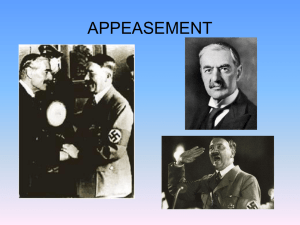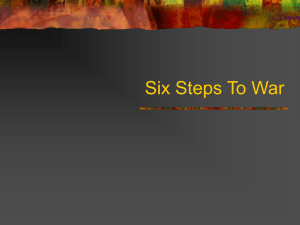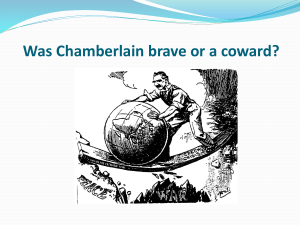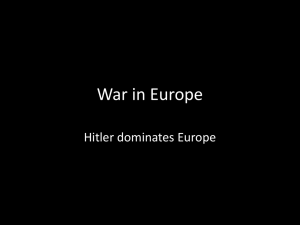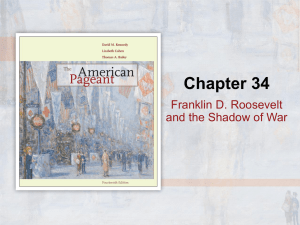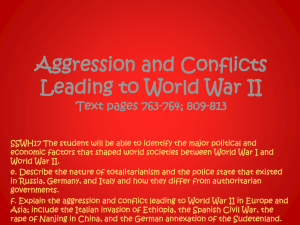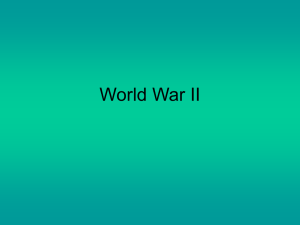September 1: ORGANIZATIONAL MEETING
advertisement
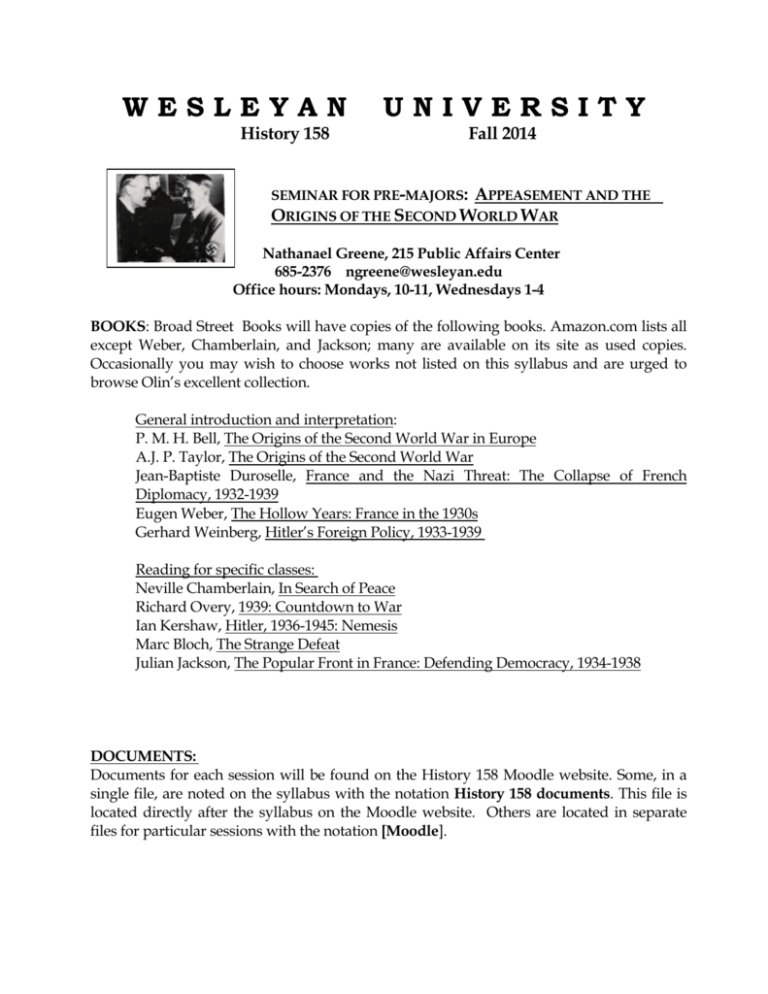
WESLEYAN UNIVERSITY History 158 Fall 2014 SEMINAR FOR PRE-MAJORS: APPEASEMENT AND THE ORIGINS OF THE SECOND WORLD WAR N Nathanael Greene, 215 Public Affairs Center 685-2376 ngreene@wesleyan.edu Office hours: Mondays, 10-11, Wednesdays 1-4 BOOKS: Broad Street Books will have copies of the following books. Amazon.com lists all except Weber, Chamberlain, and Jackson; many are available on its site as used copies. Occasionally you may wish to choose works not listed on this syllabus and are urged to browse Olin’s excellent collection. General introduction and interpretation: P. M. H. Bell, The Origins of the Second World War in Europe A.J. P. Taylor, The Origins of the Second World War Jean-Baptiste Duroselle, France and the Nazi Threat: The Collapse of French Diplomacy, 1932-1939 Eugen Weber, The Hollow Years: France in the 1930s Gerhard Weinberg, Hitler’s Foreign Policy, 1933-1939 Reading for specific classes: Neville Chamberlain, In Search of Peace Richard Overy, 1939: Countdown to War Ian Kershaw, Hitler, 1936-1945: Nemesis Marc Bloch, The Strange Defeat Julian Jackson, The Popular Front in France: Defending Democracy, 1934-1938 DOCUMENTS: Documents for each session will be found on the History 158 Moodle website. Some, in a single file, are noted on the syllabus with the notation History 158 documents. This file is located directly after the syllabus on the Moodle website. Others are located in separate files for particular sessions with the notation [Moodle]. HISTORY 158, APPEASEMENT, FALL, 2014 -2Additionally students should explore published documentary collections in Olin Library, especially Documents on German Foreign Policy, The Foreign Relations of the United States, Documents on British Foreign Policy,1919-1939, and Documents Diplomatiques Français, 1932-1939. These documents are collected in multiple volumes. PAPERS: Each student will submit three brief reports and a major research paper. The brief reports will be due in class on the date stipulated and will be devoted to topics assigned below. These reports should be very succinct, no longer than two, double-spaced printed pages, 12-point font; a third page may be used for notes and references. Reports will be required for the sessions of September 15, 22, and 29. These should be submitted by e-mail before the beginning of class. The research paper, devoted to a topic chosen in consultation with the instructor no later than Monday, October 6, will be due in its final form by noon on the third day of the examination period, Thursday, December 11. By October 27 each student should submit a written, detailed plan for the research and writing of the paper. First drafts of papers must be circulated by e-mail to all members of the seminar and to the instructor no later than 48 hours prior to classes scheduled for discussion of these drafts on November 17 and 24, and December 1. Examples and suggestions concerning research papers are offered on pages 913 of this syllabus. There is no set length for the research paper; it is expected to be a substantial work, carefully documented, with footnotes and bibliography. ORAL PRESENTATIONS: Every student will serve at least once as one of the discussant leaders at one or more of the classes described below in September, October, and November. Discussant leaders are responsible for setting out issues, proposing questions, and directing debate. In addition, the first draft of a research paper will receive detailed comment from a student assigned to that task at the classes of November 17 and 24, and December 1. EXAMINATIONS: There will be no examinations in this course. HISTORY 158, APPEASEMENT, FALL, 2014 -3SCHEDULE OF CLASSES, ASSIGNMENTS, AND PAPERS: SEPTEMBER 1: ORGANIZATIONAL MEETING History 158 documents: Remarks by President Reagan Remarks by Secretary of Defense Donald H. Rumsfeld September 8: THE ORIGINS OF THE SECOND WORLD WAR: FIRST THOUGHTS Choose from among the following or browse the Olin collection and select one or two studies on appeasement and the origins of the Second World War. A. J. P. Taylor, The Origins of the Second World War, Chapters I-V Anthony P. Adamthwaite, The Making of the Second World War, chs 1-6 P. M. H. Bell, The Origins of the Second War in Europe , Parts One and Two Laurence Lafore, The End of Glory: An Interpretation of the Origins of World War II Gerhard Weinberg, The Foreign Policy of Hitler's Germany Ian Kershaw, Hitler, 1936-1945: Nemesis Frank McDonough, Hitler, Chamberlain, and Appeasement R. J. Overy, The Origins of the Second World War, Chapters 1-7 Martin Kitchen, Europe Between the Wars Arnold Wolfers, Britain and France Between Two Wars Eugen Weber, The Hollow Years: France in the 1930’s Nathanael Greene, From Versailles to Vichy: The Third French Republic, 1919-1940 C. L. Mowat, Britain Between the Wars, chapters 8-11 Andreas Hillgruber, Germany and the Two World Wars Keith Eubank, World War II: Roots and Causes R. A. C. Parker, Chamberlain and Appeasement, chs. 1-3 Anthony P. Adamthwaite, Grandeur and Misery: France’s Bid for Power in Europe, 1914-1940, Chapters 1-8 September 15: RIGHT AND LEFT IN FRANCE, 1934-1936 Report and discussion topic: "Both Left and Right in France excelled in fighting imaginary enemies: the Right feared a Communist takeover, while the Left feared a Fascist seizure of power. These fears were only weakly grounded in reality, but they profoundly influenced the internal and external policies of the Right and of the Left." HISTORY 158, APPEASEMENT, FALL, 2014 -4Reading: Choose from among these titles, or browse Olin’s collection for others: Eugene Weber, The Hollow Years: France in the 1930s, Chapters 1-5, or Nathanael Greene, From Versailles to Vichy: The Third French Republic, 1919-1940, or, Jean-Baptiste Duroselle, France and the Nazi Threat, Preface and Chapters I-IV, or Joel Colton, Léon Blum, Humanist in Politics, [Olin Library] Chapters I-IV, or Julian Jackson, The French Popular Front: Defending Democracy, parts 1 and 2 History 158 documents: Program of the Popular Front, January 1936 Jacques Doriot, “The France that We Want” September 22: HITLER'S REOCCUPATION OF THE RHINELAND, MARCH 1936. Report and discussion topic: "When Hitler sent troops into the Rhineland, the French authorities had no option save to defer to the British. The British, for their part, had no policy." Reading: Jean-Baptiste Duroselle, France and the Nazi Threat, Chapters V-IX, and Ian Kershaw, Hitler, 1936-1945: Nemesis, “1936: Hitler Triumphant,” and Gerhard Weinberg, Hitler’s Foreign Policy, 1933-1939, Chapters 1, 2, 7-10, and A.J. P. Taylor, The Origins of the Second World War, Chapter VI Documents: British diplomatic documents [Moodle] Edmond to Foreign Office, 3/4/36 Vansittart conversation with Corbin, 3/13/36 Vansittart conversation with Massigli, 3/14/36 G. Clerk telegram to Eden, 3/15/36 Eden to G. Clerk, 3/15/36 Beaumont-Nesbitt to G. Clerk, 3/14/36 Eden to G. Clerk, 3/16/36 Lord Cranborne’s memorandum to Eden, undated, pages 156-158 Phipps to Eden, 3/18/36 G. Clerk to Eden, 3/18/36 Eden to G. Clerk, 3/18/36 G. Clerk to Eden, 3/19/36 G. Clerk to Eden, 3/28/36 German diplomatic documents [Moodle] Forster to Berlin, 3/9/36 Hoesch to Berlin, 3/13/36 HISTORY 158, APPEASEMENT, FALL, 2014 -5 Forster to Berlin, 3/13/36 Forster to Berlin, 3/19/36 Forster to Berlin, 4/9/36 French diplomatic documents [Moodle] Report of a meeting of the Haut Comité Militaire "French military leaders discuss Germany's reoccupation of the Rhineland, 8 March 1936" André François-Ponçet on the Franco-Soviet Pact 3/25/36 The Quai d'Orsay takes stock of France's alliances 6/30/36 History 158 Documents: Policy Memorandum of the Foreign Secretary, Anthony Eden, 3/8/36 P-E Flandin’s meeting with representatives of Locarno powers, 3/10/36 September 29: NON-INTERVENTION IN THE SPANISH CIVIL WAR. Report and discussion topic: "France, led by men of the Left, wandered down the road to appeasement, following reluctant leaders who knew in their hearts that non-intervention was dangerous. The French statesmen who feared war over aid to the Spanish Republic were frightened by hobgoblins out of their own imagination." Reading: Julian Jackson, The French Popular Front: Defending Democracy, part 3, or Joel Colton, Leon Blum, [Olin Library] chapters V-VIII, and Jean-Baptiste Duroselle, France and the Nazi Threat, Chapter X, and Eugene Weber, The Hollow Years, Chapter VI, and Gerhard Weinberg, The Foreign Policy of Hitler's Germany, chapters 11 and 12 Documents: British diplomatic documents [Moodle] G. Clerk to the Foreign Office, 8/7/36 G. Clerk to the Foreign Office, 8/8/36 G. Clerk to the Foreign Office, 8/11/36 Thomas to Cadogan, 8/11/36 Minute by Sargent, 8/12/36 Eden to G. Clerk, 8/24/36 German diplomatic documents [Moodle] Welczeck to the Foreign Ministry, 8/6/36 Welczeck to the Foreign Ministry, 8/10/36 Welczeck to the Foreign Ministry, 8/21/36 HISTORY 158, APPEASEMENT, FALL, 2014 -6 Forster to the Foreign Ministry, 12/11/36 Welczeck to the Foreign Ministry, 12/24/36 History 158 documents concerning France in 1936 and the Spanish Civil War Léon Blum, Speech at Luna Park, August 1936 The American Ambassador in France on the reasons why the Blum government refuses to supply arms to the Spanish Republic, 27 July 1936" “Sir George Clerk warns Yvon Delbos of the dangers of French intervention in the Spanish Civil War" Manifesto by General Francisco Franco, 7/17/36 October 6. FROM VIENNA TO MUNICH: HITLER AND CHAMBERLAIN IN 1938. Discussion topic: "Our policy is not one of dividing Europe into opposing blocs of countries, each arming against the other amidst a growing flood of ill-will on both sides, which can end only in war. That seems to us to be a policy which is dangerous and stupid." -- Neville Chamberlain. "It is my unalterable decision to smash Czechoslovakia by military action in the near future. It is the business of the political leadership to await or bring about the suitable moment from a political and military point of view.”– A. Hitler, May 30, 1938 Reading: [For October 6 and 13] Jean-Baptiste Duroselle, France and the Nazi Threat, Chapters XI and XII, and Neville Chamberlain, In Search of Peace, and A.J. P. Taylor, The Origins of the Second World War, Chapters VII and VIII, and Gerhard Weinberg, The Foreign Policy of Hitler's Germany, Chapters 23-25, or Ian Kershaw, Hitler, 1936-1945: Nemesis, Chapter 2, or P. M. H. Bell, The Origins of the Second World War in Europe, chapter 14 History 158 documents for October 6: "The Hossbach Memorandum," November 10, 1937 Neville Chamberlain, speech to the House of Commons, March 24, 1938 Hitler’s Instructions to Henlein, March 28, 1938 "Halifax to Nevile Henderson in Berlin, May 21, 1938 "Halifax to Phipps in Paris, May 22, 1938 "Hitler's directive for “Operation Green,” May 30, 1938 "Halifax to Newton in Prague, July 18, 1938 Nevile Henderson to Halifax, August 22, 1938 HISTORY 158, APPEASEMENT, FALL, 2014 -7October 13: MUNICH Discussion topic: “The settlement at Munich was a triumph for British policy, which had worked precisely to this end; not a triumph for Hitler, who had started with no clear intention. Nor was it merely a triumph for selfish or cynical British statesmen, indifferent to the fate of faroff peoples or calculating that Hitler might be launched into war against Soviet Russia. It was a triumph for all that was best and most enlightened in British life." -- A. J. P. Taylor. History 158 documents Neville Chamberlain, radio broadcast, 9/27/38 Neville Chamberlain, “Peace for Our Time,” 9/30/38 Speech by Neville Chamberlain after the Munich Conference The Munich Accords House of Commons by Harold Nicholson Hodgson writing about Chamberlain in 1938 Winston Churchill, Speech to the House of Commons British diplomatic documents [Moodle ] Minutes of conversations between Hitler and Chamberlain at Berchtesgaden, September 15, 1938 ( notes by Chamberlain and Schmidt) Record of Anglo-French Conversations held at No. 10 Downing Street, September 18, 1938 Notes of a conversation between Hitler and Chamberlain at Godesberg, September 22, 1938 Phipps to Halifax, September 24 and 25, 1938 Note from the Czechoslovak Minister to Viscount Halifax, September 25, 1938 Record of Anglo-French conversations held at No. 10 Downing Street, September 25 and 26, 1938 Notes of a Conversation between the Prime Minister and Herr Hitler, September 30, 1938 HISTORY 158, APPEASEMENT, FALL, 2014 -8October 27 : WAR OVER POLAND, SEPTEMBER, 1939. Discussion topic: "It is unlikely that Hitler intended the actual war against Great Britain and France which broke out in 1939. The war of 1939, far from being welcome, was the result of diplomatic blunders on both sides." Reading: Richard Overy, 1939: Countdown to War, and A. J. P. Taylor, The Origins of the Second World War, Chapters IX- XI, and Jean-Baptiste Duroselle, France and the Nazi Threat, Chapters XIII-XV, and Gerhard Weinberg, The Foreign Policy of Hitler's Germany, chapters 26-29, or Ian Kershaw, Hitler, 1936-1945: Nemesis, chapters 3-5, or P. M. H. Bell, The Origins of the Second World War in Europe, chapter 15 History 158 Documents: Neville Chamberlain – September 1, 1939 Neville Chamberlain, letter dated September 10, 1939 Memoir by Georges Bonnet Adolf Hitler, November 23, 1939 November 3: THE FALL OF FRANCE, 1940. Discussion topic: How would you evaluate the conclusions drawn by Marc Bloch and Eugene Weber in explanation of France’s defeat in 1940? "The generation to which I belong has a bad conscience. From laziness and cowardice, we let things take their course. . . . It was entirely owing to our ministries that we were illprepared for war. . . "--Marc Bloch Eugene Weber writes about “the inexorable march to war of a society that was, and wasnot, helpless to affect its own fate. For men and women . . . are not objects of history – playthings of ideas, currents, laws that they can’t inflect. They are responsible subjects: actors who write and rewrite their script while moving from one decision to the next, or, failing to decide, resign the script to others. Each choice, each failure to make a choice commits them to a course and sets the limits of their future choices. Decisions and events are not the work of fate . . . . Not individually, but taken as a whole, the French of the 1930’s would not, and could not decide. They allowed others to forge their destiny and had to pay for this abdication.” HISTORY 158, APPEASEMENT, FALL, 2014 -9Reading: Marc Bloch, The Strange Defeat, and Eugene Weber, The Hollow Years, Chapters IX and X, or Julian Jackson, The Fall of France: The Nazi Invasion 1940, or Joel Colton, Léon Blum, Humanist in Politics, Chapters XI-XIII History 158 documents Excerpts from speeches and writings of Léon Blum, Charles Spinasse, Pierre Laval, and Philippe Pétain ____________________________________________________________________ November 10: NO CLASS: PREPARATION OF RESEARCH PAPERS. November 17: FIRST DRAFTS OF RESEARCH PAPERS. November 24: FIRST DRAFTS OF RESEARCH PAPERS. December 1: FIRST DRAFTS OF RESEARCH PAPERS. THE FOLLOWING ARE EXAMPLES OF RESEARCH PROJECTS: Pacifism in thought and action in Britain and France. Anthony Eden, British Foreign Secretary: Facing the Dictators. Georges Bonnet, French Foreign Minister: Defender of Peace? Edouard Daladier: the "Mystery of the Bull of the Vaucluse” British Labour's Foreign Policy: Apostles of Appeasement? Studies of British Prime Minister Neville Chamberlain. The British (or French) Press in the 1930's. Ambassadors in Berlin and Rome, e.g., Neville Henderson, André François-Poncet. British Fascism and foreign policy. King Edward VIII (a/k/a the Duke of Windsor) and foreign policy. Winston Churchill in the 1930's Studies of particular figures, for example: Pierre Laval in the 1930's Marcel Déat, Robert Brasillach, and/or Jacques Doriot, French "fascists" HISTORY 158, APPEASEMENT, FALL, 2014 -10Charles Maurras and the Action Francaise in the 1930's Marceau Pivert and left-wing socialism in France Albert Speer, Hitler's architect and Armaments Minister Paul Reynaud, next-to-last Prime Minister of the Third French Republic Andre Malraux and the Spanish Civil War Yvon Delbos, French Foreign Minister, 1936-1938 Charles de Gaulle and French war preparations Labor unions in France and foreign policy French military planning Italy as a factor in international relations. The Vatican in European diplomacy The Spanish Civil War as a "prelude to World War II". French Communism and the Soviet Union. Various key pacts, such as the Franco-Soviet Pact of 1935 or the Nazi-Soviet Pact of 1939. Ideology and foreign policy: the cases of Germany, Britain, and the USSR. STUDENTS HAVE CHOSEN THESE TOPICS PREVIOUSLY: The crisis over Poland in 1939. Communism and the French Press. Great Britain and the Spanish Civil War. The Pacifism of Léon Blum. Non-Intervention in the Spanish Civil War: France and Italy. Pacifism in Great Britain. The French Communist Party and the Soviet Union. Hitler and Czechoslovakia. Churchill in the 1930's. Chamberlain's motives. Léon Blum as Political Leader and Statesman. British Military Thinking and British Foreign Policy. The Roots of the Vichy Regime. Stalin's Foreign Policy in the 1930's. The Nazi-Soviet Pact. Italy and Great Britain: The Breakdown of the Relationship. Spanish Neutrality in World War II. Antisemitism in France and Britain. Mussolini. The Nazi Economic Recovery in the 1930's. British Rearmament and Foreign Policy. Chamberlain and Munich. HISTORY 158, APPEASEMENT, FALL, 2014 -11Charles Maurras in the 1930's. German Rearmament. British Intelligence Services and Munich. The German Victory of 1940. The Sudeten Question. Soviet Foreign Policy in the 1930's. Economic Developments: France in the early 1930’s Von Neurath and German Diplomacy Mussolini, Hitler, and Spain Daladier, Chamberlain, and Czechoslovakia Mussolini and Hitler: the Relationship French Communism, 1932-1936 French Fascism, 1934-1936 The British Foreign Ministry: the Professionals Poland, 1938-1939 The Nazi-Japanese Alliance Comparative Rearmament Neville Chamberlain Non-Intervention in the Spanish Civil War Intervention in the Spanish Civil War Hungary in International Affairs in the 1930s Winston Churchill The Spanish Civil War The German Military and Hitler’s Plans Benes, France, and Britain Churchill in the 1930s The Hitler-Mussolini Relationship The Formation of the French Popular Front Hitler’s Symbols Policies of Appeasement The Nazi-Soviet Pact Vansittart and the British Foreign Office Mussolini and Hitler Ambassador Joseph Kennedy Teachers and Pacifism in France The German-Japanese Alliance Von Neurath and the German Foreign Ministry Hitler’s Invasion of the Soviet Union Manual Azaña and the Spanish Republic British Perspectives on the USSR Hitler and the Anschluss HISTORY 158, APPEASEMENT, FALL, 2014 -12Spanish Neutrality during World War II Chamberlain and Churchill The Fall of France 1940 Chamberlain and Hitler 1938 Planning Hitler’s Invasion of Poland Georges Bonnet, French Foreign Minister 1938 Stalin and the Spanish Civil War Churchill's Naval Strategy Journalism and the Spanish Civil War French Film and the Popular Front British Labour and Appeasement Hungary in the 1930s Mussolini and the Spanish Civil War Mussolini and Hitler Hitler's Invasion of Poland, 1939 Lord Halifax, 1937/1938 French Alliances The Vatican and Hitler French Views of Disaster Chamberlain and Churchill Chamberlain and Eden British Fascism Edward Benes Stalin and Hitler Hitler's Propaganda Franco-British Relations 1936-1938 France and non-intervention in the Spanish Civil War Italy Conquers Ethiopia The Soviet Union and the Spanish Civil War Chamberlain and the Munich Conference Changes in British Policy, September 1938 - March 1939 Neville Chamberlain and Appeasing Hitler German Rearmament Origins of the Spanish Civil War The Hossbach Memorandum HISTORY 158, APPEASEMENT, FALL, 2014 -13The Relationship Between Hitler and Mussolini Hitler's Planning in 1939 War Cabinet Crisis: Churchill vs Halifax Japan and Nazi Germany International Reaction to the Fall of France, 1940
